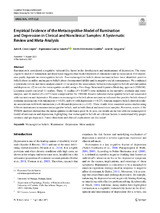Mostrar el registro sencillo del ítem
Empirical Evidence of the Metacognitive Model of Rumination and Depression in Clinical and Nonclinical Samples: A Systematic Review and Meta-Analysis
| dc.contributor.author | Cano‑López, Julia B. | |
| dc.contributor.author | García‑Sancho, Esperanza | |
| dc.contributor.author | Fernández‑Castilla, Belén | |
| dc.contributor.author | Salguero, José M. | |
| dc.date.accessioned | 2021-11-02T12:59:43Z | |
| dc.date.available | 2021-11-02T12:59:43Z | |
| dc.date.issued | 2021 | |
| dc.identifier.uri | http://hdl.handle.net/10396/22012 | |
| dc.description.abstract | Rumination is considered a cognitive vulnerability factor in the development and maintenance of depression. The metacognitive model of rumination and depression suggests that the development of rumination and its association with depression partly depends on metacognitive beliefs. Two metacognitive beliefs about rumination have been identified: positive beliefs about its utility and negative beliefs about the uncontrollability and its negative social consequences. We conducted a systematic review and meta-analysis aimed: (1) to analyze the associations between metacognitive beliefs and rumination and depression; (2) to test the metacognitive model, using a Two-Stage Structural Equation Modeling approach (TSSEM). Literature search retrieved 41 studies. These 41 studies (N = 10,607) were included in the narrative synthesis and meta-analysis, and 16 studies (N = 4477) were comprised for the TSSEM. Results indicated metacognitive beliefs are associated with rumination and depression. Measures on metacognitive beliefs about rumination indicated that positive beliefs showed moderate associations with rumination (r = 0.50), and low with depression (r = 0.27); whereas negative beliefs showed moderate associations with both rumination (r = 0.46) and depression (r = 0.49). These results were consistent across studies using different instruments to measure metacognitive beliefs, and in both clinical and nonclinical samples. Moreover, results of the TSSEM analyses showed that the metacognitive model had a good fit. In sum, our results are in line with the metacognitive model of rumination and depression, highlighting that metacognitive beliefs are relevant factors to understand why people ruminate and get depressed. Future directions and clinical implications are discussed. | es_ES |
| dc.format.mimetype | application/pdf | es_ES |
| dc.language.iso | eng | es_ES |
| dc.publisher | Springer | es_ES |
| dc.rights | https://creativecommons.org/licenses/by/4.0/ | es_ES |
| dc.source | Cognitive Therapy and Research 46, 367-392 (2022) | es_ES |
| dc.subject | Metacognitive beliefs | es_ES |
| dc.subject | Rumination | es_ES |
| dc.subject | Depression | es_ES |
| dc.subject | Meta-analysis | es_ES |
| dc.title | Empirical Evidence of the Metacognitive Model of Rumination and Depression in Clinical and Nonclinical Samples: A Systematic Review and Meta-Analysis | es_ES |
| dc.type | info:eu-repo/semantics/article | es_ES |
| dc.relation.publisherversion | https://doi.org/10.1007/s10608-021-10260-2 | es_ES |
| dc.relation.projectID | Gobierno de España. PSI2017-83463-R | es_ES |
| dc.rights.accessRights | info:eu-repo/semantics/openAccess | es_ES |

